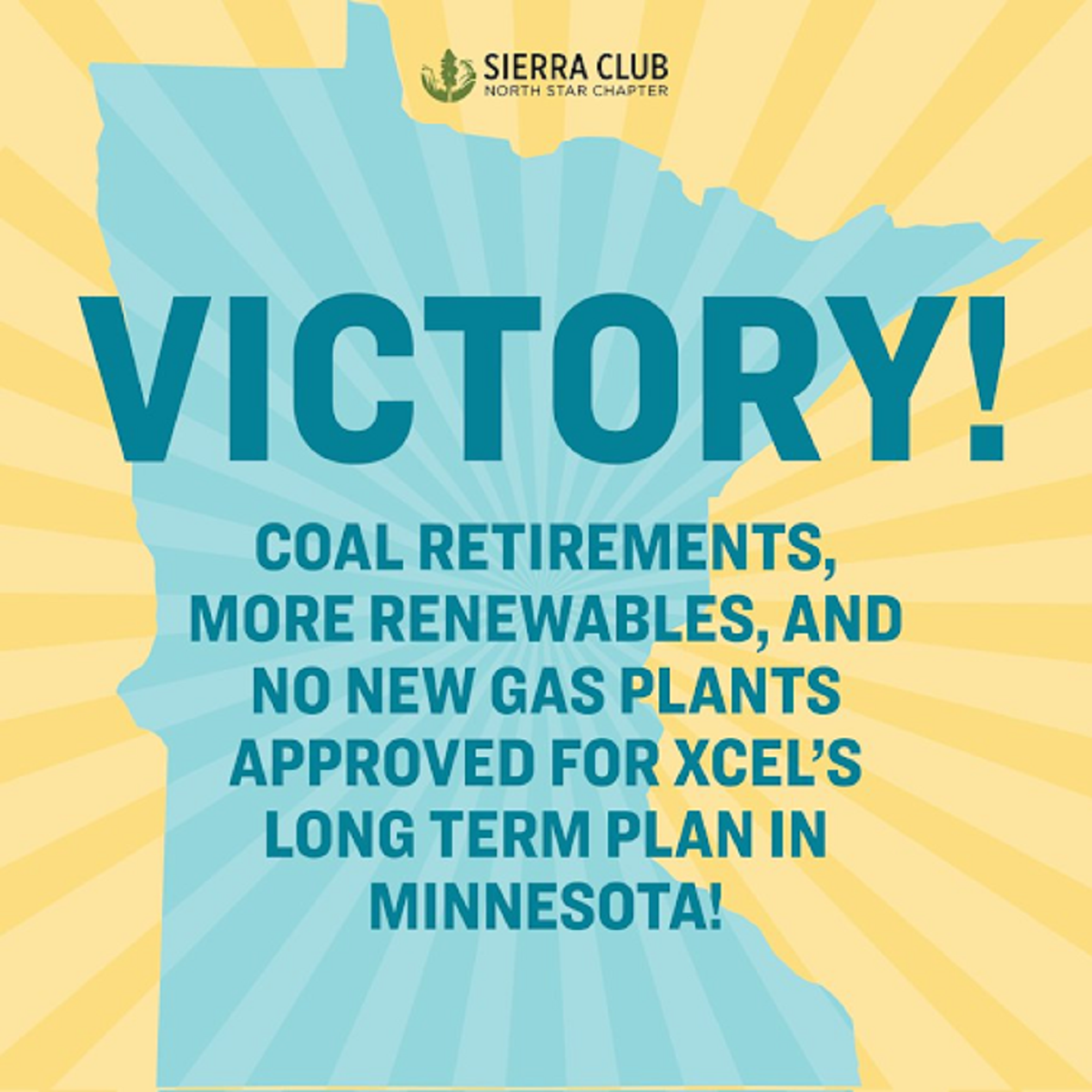This week, the Minnesota Public Utilities Commission (PUC) approved, with modifications, Xcel Energy’s Integrated Resource Plan, a 15-year energy plan for customers in Minnesota. Since the plan was filed in 2019, thousands of Minnesotans have weighed in, the Sierra Club and many other stakeholders conducted robust analysis and submitted alternative plans, and now it’s clear that our work has made a difference. The plan that the PUC approved represents a significant step towards a Minnesota that is powered by 100 percent clean and renewable energy, although there is much work that still remains to be done.
How did we get here?
When Xcel first filed its plan in 2019, we were encouraged by Xcel’s plans to retire its coal plants by 2030, but discouraged by Xcel’s plans to build a huge new gas plant and that Xcel missed opportunities to develop local, equitable energy. The Sierra Club developed an alternative plan, the Clean Energy for All Plan, using the same modeling software as Xcel, that would save customers $2.2 billion while avoiding building new gas plants, as well as increasing rooftop solar, wind, battery storage and utility scale solar. In a huge victory for Minnesotans, Xcel responded to growing opposition to new fossil generation by dropping its proposal to build the Sherco gas plant last summer. Unfortunately, Xcel still proposed to build two new gas peaker plants that would run less often instead of the 100 percent renewable energy and storage solution that we proposed in our Clean Energy for All Plan.
What Did the Minnesota Public Utility Commission Approve?
The Commission spent days in hearings discussing Xcel’s proposed plans, along with the three alternative proposals from the Sierra Club, Citizens Utility Board Minnesota, and Clean Energy Organizations, an alliance of Fresh Energy, Minnesota Center for Environmental Advocacy, the Union of Concerned Scientists, and theClean Grid Alliance. On February 8, the Commission approved Xcel’s updated plan with some key modifications.
The plan is, on balance, a huge win for our climate and Xcel customers. The Commission approved:
-
The retirement of Xcel’s remaining 1,498 megawatts (MW) of coal: Allen S. King plant in 2028 and Sherco 3 plant in 2030.
-
A significant expansion of utility-scale wind and solar energy
-
Xcel’s withdrawal of plans to build the Sherco Combined Cycle gas plant;
-
Requirements for Xcel to work with stakeholders to allow customer-owned (distributed) solar to compete on an even playing field with utility-scale generation as part of Xcel’s next resource plan in 2024; and
-
Requirements for Xcel to do community outreach and establish a stakeholder group to design programs for energy-burdened customers, improve access to energy efficiency and renewables, address workforce diversity, design distributed generation programs to ensure equitable access to BIPOC communities, adopt practices of procedural justice, and form an environmental justice accountability board.
The Commission did not approve any new gas in Xcel’s plan. They did not reject or approve Xcel’s proposal to build two new fossil gas peaker plants instead of the Sherco gas plant, instead requiring Xcel to analyze renewables and storage alternatives, and return to the Commission with their findings.
What happens next?
While we made significant progress in this resource plan, Xcel and the Commission missed some opportunities to ensure Xcel is on a path to 100 percent clean & equitable energy. We still have work to do to stop new gas plants, advocate for customer- and community-owned solar energy, and support energy justice and procedural justice in energy planning.
We will celebrate our victory! Thank you to everyone who submitted a comment, spoke at a public hearing, attended an event, signed a petition, and volunteered to push Xcel and the Commission to improve Xcel’s plan. You made a difference! Look out for an invitation to celebrate this spring!
We will fight against building new gas plants in a climate crisis. Despite all of the analysis demonstrating Xcel doesn’t need to build new gas in the midst of a climate crisis, Xcel still intends to move forward with its proposed peaker plants in Fargo, North Dakota and Lyon County, Minnesota. We will continue to demonstrate that moving towards 100 percent clean energy is more cost effective and better for our climate and health than building new fossil gas plants. Xcel already operates more than 2,400 MW of gas and oil peakers. We don’t need more fossil fuels; we can meet energy and reliability needs with cost-effective renewable energy and energy storage.
We will build our movement for a just transition to 100 percent clean and equitable energy. We will work with our partners to engage in the stakeholder processes established by the Commission for both customer-owned distributed solar and energy equity. And we will continue to look for opportunities to support customer and community owned solar, support communities in demanding more accessible programs for energy efficiency and renewable energy, and ensure that our most vulnerable communities are able to benefit from energy efficiency programs and clean energy.

